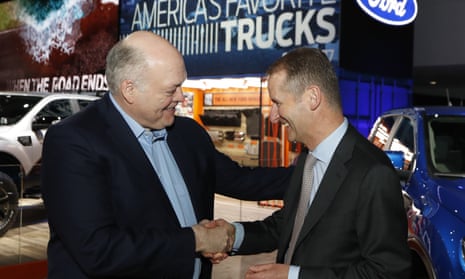Ford and Volkswagen announced details of a new alliance on Tuesday as the two car companies look to cut the cost of the technological revolution now shaking the industry and deal with slowing sales.
The companies will start with the development of commercial vans and mid-size pickups but the alliance will also involve sharing resources on autonomous vehicles, mobility services and electric vehicles. Car manufacturers are now competing with cash rich tech companies including Google as technology redefines transportation.
“Over time, this alliance will help both companies create value and meet the needs of our customers and society,” Ford’s chief executive, Jim Hackett, said at the Detroit auto show He said the deal would give the companies “the opportunity to collaborate on shaping the next era of mobility”.
Ford and VW signed a memorandum of understanding last June to explore several joint projects, including the development of a range of commercial vehicles.
Hackett has suggested that VW could also build Ford-branded cars in Europe.
The alliance would be the largest of its kind in the industry and comes as both companies have struggled. This month, Ford announced it was cutting thousands of jobs in Europe and closing plants. Its European sales fell 2.3% in the first 11 months of last year.
In an interview with Bloomberg, Hackett said Britain’s decision to leave the European Union had hurt the company’s “evolution” in Europe.
“As it relates to Europe, this is not just a new problem,” Hackett said. “We think there’s a design in the future that allows us to be there with Ford-branded products. But we have to get the industrial system in the right construct for that. I’m not going to pull any punches – Brexit hurt.”
But Hackett said Ford would not leave Europe as General Motors did in 2017, when it sold Opel and Vauxhall to PSA Group, owners of Peugeot and Citroën.
Volkswagen, meanwhile, has its own issues and sales have been hit by “dieselgate” – the revelation that VW executives had gamed emission tests by installing illegal software in 11m diesel cars.
Both companies have been hit by falling sales of diesel vehicles and by a slowdown in the Chinese market, the world’s largest, where car sales recently fell for the first time in 20 years. Analysts are also expecting the US market to contract over the next two years after several years of growth.
Michelle Krebs, an executive analyst for Autotrader, said an alliance would come at a crucial moment for both companies. Both are investing billions in new technology including autonomous vehicles and electric cars.
“The cost of developing these technologies is high and nobody knows when there will be a payoff,” she said. “It’s all expense and no clear path to profit.”
Ford has earmarked $15bn for electrified and driverless vehicle technology in the coming years and is renovating Detroit’s landmark Michigan Central Station into a “mobility lab” for new car technology.
